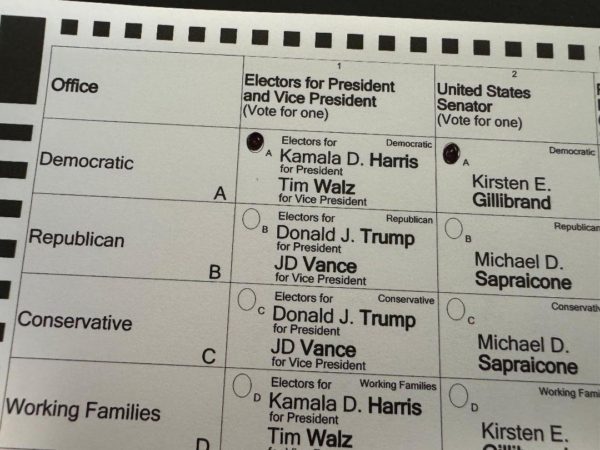11.30 Lou Carnesecca dies at 99.
11.29 Lance Morrow dies at 85.
11.28 Thanksgiving at the Beekman Arms.
11.26 Gladiator II
11.26 Patricia J. Williams in NYRB, reviewing Separated, by Errol Morris: What, then, to make of a constitutional democracy that builds such a payment scheme into its very system of justice? What to make of a political regime that explicitly designs an immigration policy for removing children from parents just to “disincentivize” future migrants from seeking asylum within its borders? That, of course, is the essence of the “zero tolerance” child separation program begun under President Donald Trump.While unaccompanied children had been detained by previous administrations, children arriving with their families had not been routinely taken from their parents unless those parents represented a threat to their health or welfare. And never before in our history had there been an actual policy of removal devised simply as theatrical cruelty that might serve to frighten other migrants from coming here.”
11.26 Fintan O’Toole in NYRB: “Biden has been very good at doing what Trump claims to be capable of but isn’t: getting big things done. The president had tangible successes in overseeing the rollout of the Covid-19 vaccine, reducing unemployment to its lowest level in fifty years, extending access to health care, beginning the transition of American industry to a post-carbon economy, and tackling the dreadful state of much of the country’s infrastructure. Yet he was terrible at communicating those achievements to the general public. This was partly because of his wan and increasingly frail presence. But it was also because many Americans saw his presidency as a truck stop rather than a highway, a hiatus rather than a trajectory. Biden got elected by offering quiet and healing. Perhaps Americans got bored with quietness. His administration’s objectively significant accomplishments could not break through to swing voters, many of whom had chosen Biden because they wanted to get politics (which had become, in effect, Trump’s tantrums and frenzies) out of their heads for a while. And in this Biden succeeded all too well. Biden allowed people not to have to think about Trump. His administration was understood as a form of convalescence, a respite from all the craziness and chaos of Trump’s feverish presidency. But it’s hard to make voters think of a nursing home as a source of energy. The very existence of a competent federal government, going about the ordinary business of trying to make people’s lives better, allowed for a creeping amnesia. It became possible to forget what it felt like to live under a Trump presidency, to wipe away all the reasons Trump left the Oval Office with an abysmal approval rating of 34 percent.”
11.26 Fintan O’Toole in NYRB: “In this campaign, he let everything (from Arnold Palmer’s penis to the greatness of the fictional serial killer and cannibal Hannibal Lecter) hang out more than ever. Trump presented to the electorate not just his Ego but his Id. His public utterances were increasingly like a version of Ulysses written by someone on a bad acid trip. His stream of consciousness was more like a meander of unconsciousness. Random thoughts surfaced like the sharks with which he was so weirdly obsessed: `A lot of shark attacks lately. Do you notice that?… I watched some guys justifying it today: “Well, they weren’t really that angry. They bit off the young lady’s leg because of the fact that they were not hungry, but they misunderstood who she was.” These people are crazy.’ This supersaturation of knowledge about Trump is what was discombobulating for the Democrats. In the old normality they still inhabit, it was natural to think, “If only people knew…” In the old politics, it was sensible to ask (with T.S. Eliot), “After such knowledge, what forgiveness?” But voters did know, and they were, on the whole, willing to offer not just forgiveness but trust and approbation. In this new era the New Age creed that letting it all hang out is a sign of honesty and authenticity has become the great asset of the right. The more unfiltered Trump became, the more real and sincere he seemed to a majority of voters.”
11.25 Tom Nichols in The Atlantic: “If citizens and their representatives react to every moment of trollery over the coming weeks, they will be exhausted by Inauguration Day. Trump will now dominate the news cycle almost every day with some new smoke bomb that is meant to distract from his attempts to stock the government with a strange conglomeration of nihilistic opportunists and self-styled revolutionaries. He will propose plans that he has no real hope of accomplishing quickly, while trying to build an aura of inevitability and omnipotence around himself. (His vow to begin mass deportations on his first day, for example, is a logistical impossibility, unless by mass he means “slightly more than usual.” He may be able to set in motion some sort of planning on day one, but he has no way to execute a large-scale operation yet, and it will be some time before he has anywhere to put so many people marked for deportation.) The attempt to build Trump into some kind of unstoppable political kaiju is nonsense, as the hapless Matt Gaetz just found out. For all of Trump’s bullying and bluster, Gaetz’s nomination bid was over in a matter of days.”
11.25 Jo Brill and Scott and her sister Marti for dinner.
11.25 Earl Holliman dies at 96
 11.24 At the end of the driveway.
11.24 At the end of the driveway.
11.24 Jamelle Bouie in the Times: “The power to unilaterally adjourn Congress and then govern without its input does not exist in the Constitution, regardless of the wording of Article II, Section 3. This is because that power would be an act of sovereign will. In a republic, the people represented assemble in a legislature and only the people represented can adjourn themselves. The Congress is “self-moving and self-dependent,” William Rawle writes in his 1825 commentary, “A View of the Constitution of the United States.” “Although it may be convened by the executive,” he continues, “it cannot be adjourned or dissolved by it.” It is the power of a sovereign monarch to call and dissolve a representative body at will. To use an example that would have been relevant to the framers of the Constitution, when Charles I dissolved Parliament in 1629 for a third and decisive time — and imposed personal rule on England — he did so on a claim of royal prerogative, extending from divine right. But our Constitution does not affirm divine right. It does not grant royal prerogative. Donald Trump cannot adjourn Congress like a king because the Constitution does not recognize kings or any sovereignty other than that of the people. Now, obviously, this will not stop Trump from trying to assert a power to adjourn Congress and appoint his nominees. And while key senators have voiced their intent to fulfill their constitutional duty, there is still some chance that enough Republicans would roll over and grant Trump his recess. Nonetheless, it is still important that opponents of Trump assert that the power Trump is claiming does not exist, that it is an illegitimate and unconstitutional exercise of authority, and that he would be doing it to install loyalists who will act in his interest, and those of his billionaire donors. . . . The reason it is important to make this point gets to a critical fact about the 2024 presidential election. Donald Trump did not win a mandate for autocracy. . . .He didn’t win a majority of votes cast, although he came close, and he carried the critical battleground states by slim margins. Overall, Trump won one of the narrowest victories in American political history. This election was not a grand public affirmation for his most expansive plans and aggressive schemes. The electorate was as close to evenly divided (Trump is ahead by less than two percentage points in the popular vote) in a system where someone has to win. The marginal Trump voter — that is, the person who put him over the top — wants lower prices and cheaper homes, not chaos, dysfunction and autocratic, strongman government. But there are no real Trump plans to improve life for most Americans. If there is [a] favorable terrain for a fight, this is it.”
 11.23 A Moon for the Misbegotten at the Majestic Theater in West Springfield MA.
11.23 A Moon for the Misbegotten at the Majestic Theater in West Springfield MA.
11.22 Aaron Judge receives his second MVP award, Shohei Ohtani his third.
11.22 Nick Gourevitch, pollster for the Harris campaign, quoted in the Washington Post on why Harris lost: “[R]easons number one, two and three are the economy and inflation. If you look at the 15 percent middle of the electorate, the swing voters, they said inflation was their top issue. They gave President Biden 73 percent disapprove on the economy. And they retrospectively approved of Trump’s performance on the economy, even if they held mixed opinions of him personally. When you have people who are essentially [saying], “My personal financial situation is very challenging and very expensive, I need somebody to fix that” — that was a really challenging dynamic. To be honest, if you ever did a focus group with anybody over the last year, it is the first thing that comes up every single time.”
 11.21 Ed Kilgore in New York: “On Election Night, with characteristic modesty, Donald Trump claimed an “unprecedented and powerful mandate.” He certainly won the contest legitimately, if more narrowly than many observers initially thought. His popular-vote margin over Kamala Harris has dropped from around 3 percent on the evening of November 5 (or about two-thirds of Joe Biden’s margin in 2020) to 1.62 percent today. That’s about a half-percent smaller than Hillary Clinton’s national popular-vote margin over Trump in 2016. To make some other comparisons: Barack Obama won the popular vote by 3.9 percent in 2012 and 7.2 percent in 2008, and George W. Bush won the popular vote by 2.4 percent in the very close 2004 election. Unlike Obama and Bush, moreover, Trump did not win a majority of the national popular vote. Though it looked like he was over 50 percent on Election Night, the steady drip of late ballots has eroded his percentage to (currently) 49.87 percent, with further slippage very likely before all the votes are in. . . .[B]y any measure, the claim of an “unprecedented” mandate simply isn’t true. Trump won a very close election and will govern a country where a near majority of people have voted against him three times. . . .Given that perilous hold on power, Trump might want to reconsider his current strategy of ruling Washington like a devastated and occupied enemy city with a Cabinet largely composed of men and women who appear to hate the departments and agencies they are supposed to oversee, plus a governing plan that may rely on testing the tolerance of the federal judiciary for totally unparalleled assertions of supreme presidential powers. And Trump’s MAGA base should also cool its jets a bit. There’s certainly a degree of triumphalism in the air that really isn’t justified by the election returns.”
11.21 Ed Kilgore in New York: “On Election Night, with characteristic modesty, Donald Trump claimed an “unprecedented and powerful mandate.” He certainly won the contest legitimately, if more narrowly than many observers initially thought. His popular-vote margin over Kamala Harris has dropped from around 3 percent on the evening of November 5 (or about two-thirds of Joe Biden’s margin in 2020) to 1.62 percent today. That’s about a half-percent smaller than Hillary Clinton’s national popular-vote margin over Trump in 2016. To make some other comparisons: Barack Obama won the popular vote by 3.9 percent in 2012 and 7.2 percent in 2008, and George W. Bush won the popular vote by 2.4 percent in the very close 2004 election. Unlike Obama and Bush, moreover, Trump did not win a majority of the national popular vote. Though it looked like he was over 50 percent on Election Night, the steady drip of late ballots has eroded his percentage to (currently) 49.87 percent, with further slippage very likely before all the votes are in. . . .[B]y any measure, the claim of an “unprecedented” mandate simply isn’t true. Trump won a very close election and will govern a country where a near majority of people have voted against him three times. . . .Given that perilous hold on power, Trump might want to reconsider his current strategy of ruling Washington like a devastated and occupied enemy city with a Cabinet largely composed of men and women who appear to hate the departments and agencies they are supposed to oversee, plus a governing plan that may rely on testing the tolerance of the federal judiciary for totally unparalleled assertions of supreme presidential powers. And Trump’s MAGA base should also cool its jets a bit. There’s certainly a degree of triumphalism in the air that really isn’t justified by the election returns.”
11.21 Matt Gaetz withdraws as Trump’s pick for attorney general.
11.20 Isaac Boltansky, director of policy research at BTIG, quoted on CNN Business: “I don’t see Congress or the courts limiting the president’s authority. Ultimately, the only entity that has real power over the president’s thinking about his agenda is the stock market.”
11.20 Lydia Polgreen in the Times: “I am not given to panic. I think catastrophic thinking is almost always overblown. Panic and alarm: These are feelings that a lifetime of observing the world from a sanguine, journalistic remove, always taking the long view, had taught me to extinguish the moment they flared. What good can come from such strong emotion? After all, we’ve been here before, haven’t we? Trump was president once before, and even though he managed to enact a great deal of cruelty and bungle a pandemic, most of us survived, didn’t we? He was never that popular with voters, but even an uninspiring candidate like Joe Biden managed to defeat him soundly. . . . Yet as I’ve tried to summon that sanguine self over the past two weeks, she has stubbornly refused to show up. I have a sense that many other people are feeling similarly abandoned by their more resilient selves, instead finding a new, excruciating sense of vulnerability. The sensation has only deepened as Trump’s preposterous cabinet announcements and his cruel policy plans for grotesque campaigns of deportation, vengeful prosecution and heedless budget slashing come into view. Despite myself, I am panicking.”
11.18 David Yaffe dies at 51.
11.18 Tin Sky, by Ben Pastor
11.17 Tobin Harshaw on Bloomberg: “Let’s face it: “China First” is just code for “Abandon Ukraine First”; railing at US allies for being free-riders loses its sting when nearly all are spending on defense at record levels; a certain zillionaire gets a party line on phone calls shaping the future of Europe; a Fox News talking head who thinks a woman’s place is in the rear echelons is handed $1 trillion to defend the nation; and the idea that Israel, embroiled in wars to north and south, will be safer for annexing the West Bank is being taken seriously. . . .I concede that Trump has one thing right: China is one of the two biggest threats to the US-led global order. The problem is that other one is Trump himself.”
11.15 Ian Bogost in The Atlantic: “This week, Amazon announced a new store, Amazon Haul, that hopes to compete with Temu, Shein, and other purveyors of such items. When I opened Haul, which is available only on Amazon’s mobile app, it presented me with an array of “unbelievable finds” at “crazy low prices”: a $3.99 table runner; a pair of blue-and-white zebra-printed women’s swim bottoms for $5.99; a barrage of smartphone cases as low as $2.99; a $2.99 set of foundation brushes; a $2.99 silicone sink strainer; two dozen cork-bottomed chair-leg floor protectors for $6.99. Temu and Shein have been popular for a long time. But Amazon’s entry into this market officially makes it mainstream. The result isn’t just “low cost” shopping, but a different kind of shopping. Now people buy low-quality goods that they don’t necessarily expect to use, knowing that they’re maybe worthless, for the experience of having bought them.”
11.15 Sen. Ron Wyden, quoted in TNR: “The next four years are going to be a smash and grab under Trump.”
11.15 Jamelle Bouie in the Times: “These nominations are confirmation of Trump’s authoritarian intent, of his desire to rule by fiat and act as a king. They are early evidence that he is exactly what his critics have said he is. They are a sign that he will, in fact, be a dictator on “Day 1.” Trump will devote his second term to revenge against his enemies while the oligarchs, ideologues and apparatchiks that staff his administration pursue their narrow ends and conspire against the public good.”
11.14 In what seems like a headline straight from The Onion, The Onion has won Alex Jones’ Infowars in bankruptcy auction, and plans to shutter Jones’ InfoWars and rebuild the website featuring well-known internet humor writers and content creators. Well done, Onion! (I hope I’m not being punked.)


 11.14 Ginny and I and Tim Hart attend Life Is a Carnival: The Last Waltz Concert at Proctors. The show featured Ryan Bingham, Mike Campbell, Benmont Tench, Dave Malone, Don Was, Shannon McNally, Jamey Johnson, and others. Strong musicianship, underwhelming singing.
11.14 Ginny and I and Tim Hart attend Life Is a Carnival: The Last Waltz Concert at Proctors. The show featured Ryan Bingham, Mike Campbell, Benmont Tench, Dave Malone, Don Was, Shannon McNally, Jamey Johnson, and others. Strong musicianship, underwhelming singing.
11.13 Trump nominates Matt Gaetz as Attorney General, and Tulsi Gabbard as Director of National Intelligence. Tom Nichols in The Atlantic: “Gabbard is stunningly unqualified for almost any Cabinet post, but especially for ODNI. She has no qualifications as an intelligence professional—literally none. . . .To make Tulsi Gabbard the DNI, however, is not merely handing a bouquet to a political gadfly. Her appointment would be a threat to the  security of the United States.”
security of the United States.”
11.13 Trump nominates Pete Hegseth, a Fox News commentator and veteran who has expressed disdain for so-called “woke” policies of Pentagon leaders, opposed women in combat roles, and questioned whether the top American general was in his position because of his skin color, to be Secretary of Defense.
11.13 Allison Murrow on CNN Business Nightcap: “The president-elect on Tuesday said that Elon Musk and Vivek Ramaswamy, a two-bit pharma-bro-turned-right-wing-conspiracist, will lead a new “Department of Government Efficiency.” In trademark Muskian fashion, “DOGE” is an unsubtle nod to the memecoin he has spent the past several years hyping into a $60 billion asset (a market cap that eclipses the value of companies like Ford and United Airlines despite having no discernible use case or tangible product). The goal is to “dismantle Government Bureaucracy, slash excess regulations, cut wasteful expenditures, and restructure Federal Agencies,” Trump said in a trademark Randomly Capitalized Statement on his Truth Social site. Here’s why it’s a very silly plan: Elon and Vivek are showmen, not accountants, and this “department” is not a department but rather a commission that would operate outside the government. (A department has to get authorization from Congress, and it’s not clear that even a fully Republican Congress wants anything to do with this.) They can advise on spending all day, but only elected lawmakers will have the power to actually make the cuts. In announcing the commission, Trump said that DOGE would become “potentially, ‘The Manhattan Project’ of our time.” And 15 minutes later, Musk weighed in on X with a less dramatic but more believable proposition: “Department of Government Efficiency. The merch will be 🔥🔥🔥” If you need more evidence of how silly this whole thing is, note (as many commentators did online) that the efficiency department is being overseen by two people. “DOGE is a toothless committee formed to make a few billionaires feel important,” wrote Gordon L. Johnson II, CEO of GLJ Research and a prominent Musk critic and Tesla short-seller, in a note. “It seems clear, once again, Mr. Musk has made promises that are mathematically impossible … (and) has no idea how the appropriations process works.”
11.13 George Will in The Washington Post: “Donald Trump, whose election owed much to inflation, ran promising to increase living costs. His favorite word is (“freedom”? “justice”? don’t be silly) “tariff,” and the point of tariffs is to increase prices of domestically produced goods by depressing competition from foreign goods. (A truism: Protectionist nations blockade their own ports.) Elon Musk’s reward for services rendered to Trump’s campaign will be leadership of a commission to slice waste from and infuse efficiency into government. The world’s richest man is about to get a free public education. . . .Musk says he can cut “at least” $2 trillion from federal spending — say, one dollar in three. (Fiscal 2024 spending: $6.75 trillion.) Well, debt service (13.1 percent of fiscal 2024 spending) is not optional and is larger than defense (12.9 percent), which Trump wants to increase. Entitlements (principally Social Security and Medicare) are 34.6 percent, and by Trumpian fiat are sacrosanct. So, Musk’s promise is to cut about 30 percent of the total budget from a roughly 40 percent portion of the budget, politics be damned.”
11.12 Mike Pesca in The Atlantic: “Like human resources, the Democrats are a party of norms, procedure, bureaucracy, DEI initiatives, rule following, language policing, and compliance. It is in this way that the Democratic Party feels not so much infuriating and threatening, but just kind of an annoying bummer. In the same way that an HR manager might respond when asked for clarity, Kamala Harris frequently speaks in the lexicon of lawyerly avoidance. The Democrats banked on the idea that classic mommy-party traits—nurturing, fretting about life’s dangers—would appeal to voters worried about the chaos of Trumpism. Instead, their warnings came across as scolding, while Donald Trump’s wild antics were either embraced by his party as a selling point or dismissed as . . . showmanship. To his followers, Donald J. Trump, CEO, fits a heroic and masculine frame; to his detractors, he is a villain, yet he is always the protagonist. The cultural space that the HR department occupies, however, carries with it no archetype at all. HR is mainly reactive, and often overly cautious, executing the company’s goals with an extraordinarily low tolerance for risk. At best, this function serves as a careful, mild check on excessive behavior, and at worst, as a fussy and fear-based obstacle that distorts a company’s culture and prevents people from achieving their mission. Trump famously hates to be told what to do; the HR department exists to do just that. HR departments also have a reputation for being haters of fun. In 2016, the Democrats knew that Trump was seen as the more affable candidate. This wasn’t exactly difficult. Despite her many qualifications, Hillary Clinton had a reputation for being lawyerly, not playful. More recently, a Democratic operative told me that the party had learned its lesson from Clinton’s run, and consciously sought to brand Harris’s latest campaign as joyful. But it’s impossible to convince a skeptic that you’re the party of fun when you’re also the party accused of, and sometimes engaged in, taking beloved things away—gas stoves and cows come to mind—because “it’s good for humanity.”’
 11.11 Eagles along the Mohawk.
11.11 Eagles along the Mohawk.
11.10 Will Bunch in the Philadelphia Inquirer: “The things that pundits have been talking about since Tuesday — an economy that hasn’t worked for the working class since the time of Ronald Reagan, anxieties among white voters about a potential end to white privilege and the patriarchy, and a Democratic Party that’s lost touch with the great American middle — all factored into this election. But nothing mattered more than this: Donald Trump was returned to power by the most badly informed electorate in modern American history. In October, a Reuters/Ipsos poll found a powerfully strong connection between people who believed provably false information and whether they planned to vote for Trump or Harris. For example, Democrats held a plus-65% advantage among voters who correctly said that big-city violent crime rates are at or near record lows, while Republicans led by 26% with voters insisting this was false. The same was true for 2024’s recent sharp drop in border crossings (true, plus-59% Democrat; false, plus-17% Republican) or the stock market’s current all-time high (true, plus-20% Democrat; false, plus-9% Republican). This very much jibes with where voters get their news. An NBC News survey back in May — when Biden was still the Democrats’ deeply troubled candidate — found nonetheless that he led by landslide proportions among the shrinking number of Americans who still read a newspaper, with a 70%-21% lead. It provides some context to the never-ending online chatter complaining about tepid “both sides” traditional newsrooms underplaying the threats to democracy posed by Trump. I agree these critiques are important — a bad New York Times headline sets the tone for the entire media ecosystem — but that’s not why Trump won. The now-president-elect, according to that NBC survey, posted his biggest margin of 53%-27% among voters who don’t follow any news. Trump’s win was a triumph of the ill-informed.”
11.10 Thomas Hendrickson on The Bro Vote in The Atlantic: “It’s not just one type of talkative bro who has boosted Trump and made him more palatable to the average American. Trump has steadily assembled a crew of extremely influential and successful men who are loyal to him. Carlson is the preppy debate-club bro. Rogan is the stoner bro. Elon Musk is the tech bro. Bill Ackman is the finance bro. Jason Aldean is the country-music bro. Harrison Butker is the NFL bro. Robert F. Kennedy Jr. is the crunchy-conspiracist bro. Hulk Hogan is the throwback entertainer bro. Kid Rock is the “American Bad Ass” bro. And that’s hardly an exhaustive list. Each of these bros brings his own bro-y fandom to the MAGA movement and helps, in his own way, to legitimize Trump and whitewash his misdeeds. Some of these men, such as Kennedy and Musk, may even play a role in the coming administration. Spencer Kornhaber wrote this week that Democrats are losing the culture war. He’s right, but Trumpism extends even beyond politics and pop culture. I’ve been thinking a lot about that day I spent at the University of Georgia. Students I spoke with told me that some frat houses off campus make no secret of their Trump support, but it seemed less about specific policies and more about attitude. That’s long been the open secret to Trump: a feeling, a vibe, not a statistic. Kirk’s “free speech” exercises, which he’s staged at colleges nationwide for a while now, are only nominally about actual political debate. In essence, they are public performances that boil down to four words: Come at me, bro! Perhaps there is something in all of this that is less about fighting and more about acceptance—especially in a culture that treats bro as a pejorative.”
11.6 Derek Thompson in The Atlantic: “Inflation proved as contagious as a coronavirus. Many voters didn’t directly blame their leaders for a biological nemesis that seemed like an act of god, but they did blame their leaders for an economic nemesis that seemed all too human in its origin. The global rise in prices has created a nightmare for incumbent parties around the world. The ruling parties of several major countries, including the U.K., Germany, and South Africa, suffered historic defeats this year. Even strongmen, such as Indian Prime Minister Narendra Modi, lost ground in an election that many experts assumed would be a rousing coronation. This has been a year of global anti-incumbency within a century of American anti-incumbency. Since 2000, every midterm and presidential election has seen a change in control of the House, Senate, or White House except for 2004 (when Bush eked out a win) and 2012 (when Obama won reelection while Republicans held the House). The U.S. appears to be in an age of unusually close elections that swing back and forth, in which every sitting president spends the majority of his term with an underwater approval rating.’ |
11.5 Vote No. 92 in the 25th Elelction District in the 112th Assembly District of New York State
11.4 Quincy Jones dies at 91.
11.3 Saquon Barkley performs a backwards hurdle over a would-be tackler.
11.2 Conclave with Ginny in Saratoga Springs.
11.1 At a rally in Milwaukee, Trump had microphone problems. “Fix the mic huh. You gotta be kidding. Do you want to see me knock the hell out of people backstage? I get so angry. I’m up here seething. I’m seething, I’m working my ass off with this stupid mic. I’m blowing out my left arm, now I’m going to blow out my right arm and I’m blowing out my damn throat too because of these stupid people.” he said. Trump then took the microphone off the stand and began simulating fellatio.


